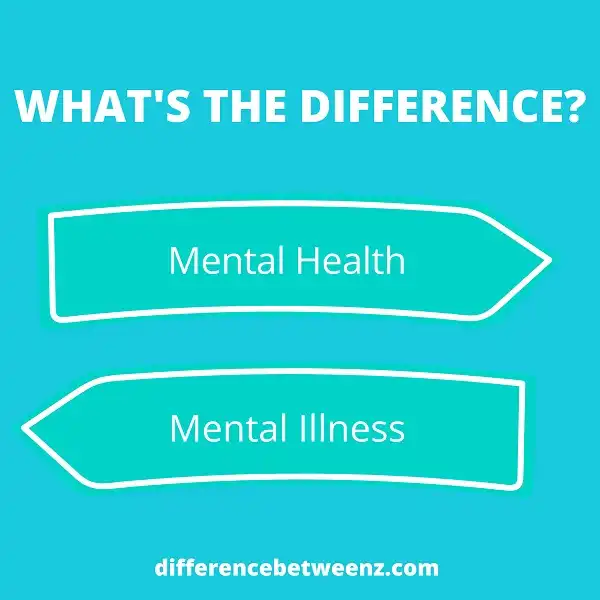Mental health and mental illness are often used interchangeably, but they are actually two different things. Mental health is a state of well-being in which an individual is able to cope with the normal stresses of life and work productively. Mental illness, on the other hand, refers to diagnosable mental disorders that significantly affect an individual’s mood, thinking, or behavior. Although the two are related, it is important to understand the distinction between them.
What is Mental Health?
Mental health is an important aspect of overall health. It refers to our emotional, psychological, and social well-being. Mental health is a state of well-being in which an individual can cope with everyday stressors, can work productively, and can make contributions to his or her community. Mental health includes our ability to feel, think, and react in ways that enhance our ability to enjoy life and deal with the challenges we face. It also helps determine how we handle stress, relate to others, and make decisions.
Mental health is important at every stage of life, from childhood through adulthood. Mental health disorders are common, but help is available. People with mental illness can get better and many recover completely. Mental health disorders include anxiety disorders, mood disorders (such as depression), schizophrenia, and eating disorders, among others. Treatment might involve medication, talk therapy (psychotherapy), or both. Mental health is a complex issue, and there is no one-size-fits-all solution. However, with treatment and support, people with mental illness can lead full and productive lives.
What is Mental Illness?
Mental illness is a general term that refers to a variety of mental health conditions. Mental illness can affect how a person thinks, feels, and behaves, and it can also lead to difficulties functioning in day-to-day life. Mental illness is a medical term that is used to describe a wide range of mental health conditions. Mental illness is a general term that is used to describe a range of mental health conditions.
Mental illness can be mild or severe, and it can caused by a variety of factors. Mental illness can be caused by genetic predisposition, brain chemistry, or stressful life events. Mental illness is treatable, and many people with mental illness live full and productive lives. Mental illness should not be stigmatized, and people who suffer from mental illness should seek treatment from a qualified medical professional.
Difference between Mental Health and Mental Illness
Mental health and Mental illness are often used interchangeably but they vary in meanings. Mental health includes our emotional, psychological, and social well-being. It affects how we think, feel, and behave.
- On the other hand, Mental illness is a group of mental disorders that lead to distress and problems functioning. Mental illness is more severe than mental health and can be diagnosed. Mental health is a state of well-being in which an individual realizes his or her own abilities, can cope with the normal stresses of life, can work productively and is able to make a contribution to his or her community.
- Mental illness, on the other hand, refers to all diagnosable mental disorders characterized by deficiencies in thought processes, emotions or behavior that cause distress and dysfunction. Mental illnesses can lead to distorted thinking, changes in mood or emotion, and impaired functioning. Mental illnesses are serious disorders that disrupt and impair a person’s thinking, feeling, moods, ability to relate to others and daily functioning.
- left untreated, Mental illness can cause serious problems that affect every aspect of life: relationships, school, work and physical health. Mental illnesses are real medical conditions that require treatment by professionals.
- Early diagnosis and intervention can make a big difference in recovery. Mental health is important at every stage of life including early childhood development, adolescence development, young adulthood developmental milestones up through successful aging in later adulthood years. Everyone should strive for optimal mental health throughout their lifespan.”
Mental health is important because it’s essential to our well-being. It’s not just the absence of mental illness but also the presence of emotional wellbeing. Positive mental health allows us to realize our full potential, cope with the stresses of life, work productively and make meaningful contributions to our communities” (Centers for Disease Control and Prevention). Everyone has mental health needs just as they have physical health needs there should be no shame or stigma attached seeking assistance for either one.”
Conclusion
Mental health and mental illness are not interchangeable terms. Mental health is a state of well-being in which every individual realizes his or her own potential, can cope with the normal stresses of life and can work productively and fruitfully. Mental illness, on the other hand, refers to diagnosable mental disorders that significantly disrupt daily functioning. While mental health is a necessary foundation for good mental health, it is not synonymous with it. Everyone experiences different levels of stress, sadness, anger, elation, and so forth; what matters is how these emotions affect one’s ability to live a fulfilling life.


